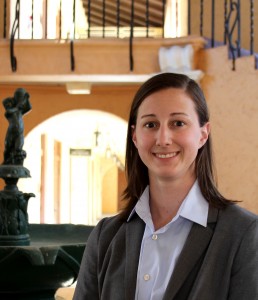Passion for writing: two student papers accepted in respected journals
Two students in professor Clark Furlow’s Advanced Corporate Law seminar at Stetson University have recently written papers accepted for publication in respected journals.
Clara Arrington, a native of Tampa, has written on the topic of enabling benefit corporations in Florida. Her paper was accepted for publication in the Hillsborough County Bar Association’s monthly magazine, The Lawyer.
The paper, “Florida considers enabling benefits corporations,” argues that Florida’s other constituency statute works to support the same goals that benefit corporations support and that a new legal framework is unnecessary.
Benefit corporations balance a stated public benefit, such as the interests of the community in which they operate, with shareholders’ interests. Arrington described how a Florida citrus farmer kept an unprofitable branch of the family business running just to keep his family employed and support the local community. When this practice was challenged by minority shareholders, a Florida court ruled that it was legal under Florida’s constituency.
Arrington said that she is fascinated by the topic of how the law interacts with business. She plans to work in the Tampa Bay region after graduating in May.
Wynn Willard, entering his third year of law school at Stetson and himself a former CEO, wrote about the regulation of executive compensation. His paper and a companion piece were accepted by the Duquesne Business Law Review and the Cornell HR Review, a journal of the Industrial and Labor Relations School.
Willard argues that criticism of compensation should first be measured against the value CEOs create for shareholders. He shared the example of Steve Jobs, whose leadership propelled Apple’s shareholder value hundreds of billions of dollars since 2003. In the same time frame, Willard explained that Motorola and Nokia executives achieved minimal and negative returns, respectively, for their shareholders. Willard’s paper cites multiple examples of government regulation of executive compensation producing unintended consequences and great costs. He advocates a cessation of federal regulation in favor of existing state laws and market forces.
Willard worked as a marketing executive at companies including Procter & Gamble, Cadbury Beverages, and Hershey Foods. He served as CEO of Nabisco Canada and New World Pasta Company. He has also taught courses on management at the University of South Florida.
“I have always been interested in law and thought my corporate background could be a good combination with it,” said Willard, who plans to graduate from Stetson in December.
He said that the seminar paper gave him an opportunity to explore a subject with which he has firsthand experience.
“You have to have a passion for what you’re doing,” Willard said.
Post date: May 6, 2014
Media contact: Kate Bradshaw
[email protected] | 727-430-1580

